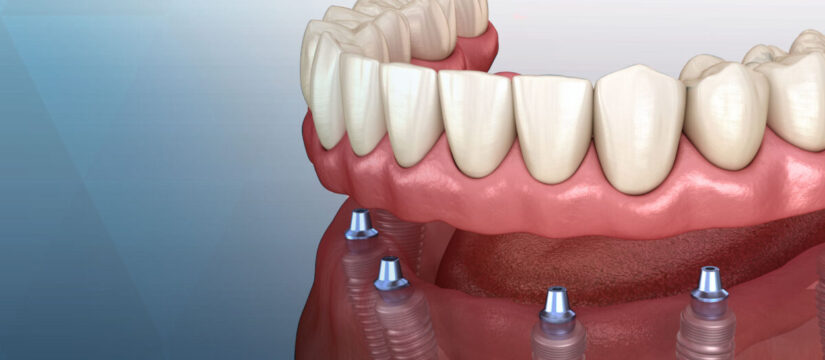
Yes, you can get teeth implants after dentures. The process begins with a comprehensive consultation with your dentist to assess your oral health and bone density. Dental implants offer a more stable and natural solution compared to traditional dentures, enhancing both function and appearance. In this article, we’ll guide you through the transition from dentures to dental implants, including the question, “Can you get teeth implants after dentures in Rockville MD?”, the benefits, and what to expect during the procedure.
Key Takeaways
- Transitioning from dentures to dental implants involves a thorough consultation and examination to assess oral health and ensure a suitable plan.
- Dental implants offer significant advantages over traditional dentures, including improved stability, prevention of bone loss, and a longer lifespan with proper care.
- Candidates for dental implants must meet specific bone density requirements, and may require bone grafting if insufficient bone is present to support the implants.
Transitioning from Dentures to Dental Implants
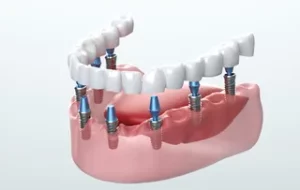
Switching to dental implants from dentures is feasible, regardless of how long you’ve worn dentures. This process usually takes four to ten months, encompassing consultations, surgeries, and healing phases. Implant-supported dentures, which attach to the jawbone using dental implants, offer a more stable and comfortable solution compared to traditional removable dentures.
There are different types of implant-supported dentures. A fixed implant-supported denture permanently attaches to the implants and cannot be removed at home. This solution provides greater stability and improved dental function, allowing you to enjoy your favorite foods without restrictions. Moreover, dental implants replace both the root and visible part of the tooth, contributing to better oral health by preventing bone loss and maintaining jawbone density.
Regular visits to your dentist ensure the chosen transition plan suits your needs and provides optimal results. This collaboration will help you transition smoothly from dentures to dental implants, achieving a more natural and functional smile.
Why Consider Dental Implants After Wearing Dentures?
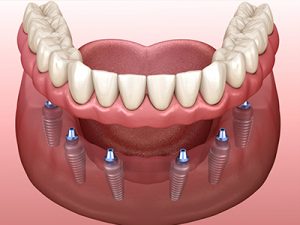
Dental implants support the jawbone, preventing the bone loss that typically occurs when wearing dentures. This stability allows for a more diverse diet, as implant-supported dentures improve chewing ability, enabling you to enjoy a wider variety of foods. Additionally, the fixed nature of implant-supported dentures eliminates the embarrassment of loose dentures, enhancing confidence in social situations.
Dental implants offer unmatched comfort, integrating with the jawbone to form a secure, stable foundation. This integration not only improves oral health but also keeps the surrounding tissues healthy and free from the irritation caused by loose dentures. These combined benefits make traditional dental implants a compelling option for anyone looking to replace traditional dentures.
Assessing Candidacy for Dental Implants
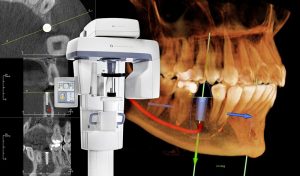
A comprehensive consultation with your dentist will help determine your suitability to receive dental implants. During this consultation, engaging in open conversations about your oral health history and any concerns you may have about transitioning from dentures will help clarify the best approach for your specific situation.
Bone Density Requirements
Sufficient bone density in the jaw is crucial for support dental implants. During the assessment, your dentist will perform a bone density evaluation to ensure you have enough bone volume to maintain bone density for successful implant placement. If insufficient bone is detected, bone grafting treatments can be considered to strengthen the jawbone, creating a solid foundation for implants.
Successful bone grafts stimulate bone growth, restoring the jaw structure and enhancing readiness for dental implants. This process involves using materials such as natural bone, synthetic bone, human donor bone, or animal source bone, depending on individual needs and preferences.
Bone grafting effectively prepares the jaw for the stability required for dental implants, including the use of a bone graft.
Health Considerations
Overall health is crucial for undergoing dental implant surgery. Several factors, including lifestyle choices such as smoking, can adversely impact the success of dental implants and should be discussed with your dentist. Managing medical conditions like diabetes or heart disease is also crucial to ensure a smooth and successful implant procedure.
Proper care and regular dental visits are vital for maintaining the health of dental implants and dental health. Many patients with existing medical conditions can still be candidates for dental implants with the right management and precautions. Consulting with your dentist will help determine the best approach based on your overall health and medical history.
The Dental Implant Procedure
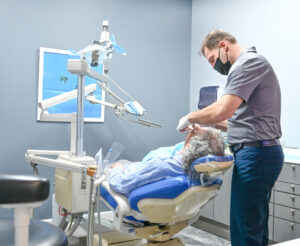
The entire procedure is guided by the type of implant and the condition of your jawbone. All-on-4 implants can sometimes be utilized to replace several teeth in an entire arch. This method requires only one implant to support the restoration.
Initial Consultation and Planning
The initial consultation and planning phase are crucial. Your dentist will perform a complete dental examination, which may include X-rays and 3D imaging, to assess your oral health and jawbone structure. Discussing your oral health history and undergoing an oral exam are key parts of this step.
If you recently had dentures removed, it’s advisable to wait until your gums have fully healed before considering implants. Your dentist can discuss various temporary options to maintain tooth support during the transition to implants.
Surgical Placement of Implants
Various anesthesia options are available during the surgical placement of implants to ensure comfort. If you choose sedation or general anesthesia, plan to have someone accompany you home.
The surgeon starts by making an incision to open the gum and expose the bone, then drills into the jawbone to create space for the implant. The implant is then positioned deep into the jawbone for stability. Precise placement is vital for the implant’s success. The surgeon meticulously ensures that the implant is secure, setting the stage for a successful integration with the jawbone.
Healing and Osseointegration
The healing process and osseointegration are vital for the success of dental implants. Osseointegration involves the jawbone growing into the implant, which can take three to six months. This process ensures that the implant becomes a stable and permanent part of your jawbone.
If bone grafting was required, the healing period might extend to about a few months. During this time, following your dentist’s care instructions is crucial to promote new bone growth and ensure implant stability. If the bone does not fuse with the implant, it may require removal. Additionally, the area must be cleaned up before making another attempt. Recovery time is essential for successful healing.
Benefits of Dental Implants Over Traditional Dentures
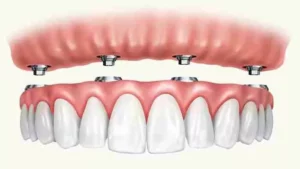
Another significant advantage is the preservation of bone density. Traditional dentures can cause bone loss over time, but dental implants help maintain bone structure and prevent facial collapse. This is because implants stimulate the jawbone, similar to natural tooth roots, promoting bone growth and stability.
The aesthetic benefits are also noteworthy. Dental implants provide a more natural look and feel, enhancing your beautiful smile and boosting your confidence. They eliminate the discomfort and inconvenience associated with loose-fitting dentures, offering a permanent and reliable solution for missing teeth.
Managing Bone Loss and Grafting Options
Bone loss is a common issue for long-term denture wearers due to the lack of stimulation that promotes bone growth. Bone grafting may be necessary to ensure sufficient jawbone mass for dental implants, particularly after long-term denture use.
Various materials can be used for bone grafting, including natural bone, synthetic bone, human donor bone, and animal source bone. Consulting a dental professional is essential to determine the appropriate grafting options based on your bone density and overall health.
Cost of Dental Implants vs. Dentures
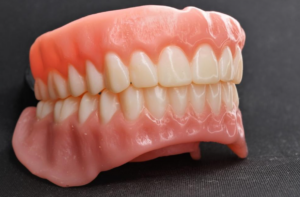
A single dental implant typically costs around $3,000, but this investment pays off in terms of durability and reduced need for future replacements. Although the cost of dental implants is higher due to their surgical nature, the long-term financial implications are more favorable compared to dentures.
Considering the overall benefits and longevity, dental implants present a cost-effective solution for replacing missing teeth. The initial investment is justified by the permanent and reliable results, enhancing both oral health and quality of life.
Post-Implant Care and Maintenance
Proper care and maintenance are crucial for the longevity of dental implants. After implant surgery, avoid rinsing or brushing the teeth for the first 24 hours to protect the surgical site. Daily oral hygiene practices, including brushing and flossing around the implant, are essential to prevent plaque buildup and ensure the implant’s longevity.
Regular visits to a restorative dentist are necessary for monitoring the health of the surrounding tissue and making any necessary adjustments. Using a Waterpik flosser can be beneficial for cleaning around implants, but it’s recommended to start at the lowest setting to avoid irritation.
Additionally, massaging the soft tissue around the implant weekly can help reduce bacteria accumulation and improve tissue health.
Consult Your Dentist About Dental Implants
Your dentist consultation is the first step in determining if transitioning from dentures to dental implants is right for you. Your dentist will provide a comprehensive evaluation and discuss the best options based on your oral health and individual needs.
Regular consultations with your dentist regularly keep you well-informed and prepared for the transition. Your dentist’s expertise will guide you through the process, offering personalized advice and addressing any concerns you may have.
Summary
Transitioning from dentures to dental implants is a journey that promises improved oral health, stability, and quality of life. Dental implants offer numerous benefits over traditional dentures, including better aesthetics, functionality, and long-term cost-effectiveness. By consulting with your dentist and following proper care guidelines, you can enjoy a permanent and reliable solution for missing teeth. Embrace the opportunity to transform your smile and life with dental implants.
Frequently Asked Questions
Can I get dental implants if I’ve been wearing dentures for a long time?
Yes, you can transition from dentures to dental implants, even after many years of wearing them. Consulting with a dental professional will help determine the best approach for your specific situation.
What are the main benefits of dental implants over traditional dentures?
Dental implants provide enhanced stability and chewing functionality compared to traditional dentures, along with aesthetic advantages and support for maintaining jawbone density. This makes them a superior choice for many individuals seeking long-term oral health solutions.
How long does the dental implant process take?
The dental implant process generally takes about four to ten months, as it involves multiple procedures to ensure proper integration and healing.
Is bone grafting necessary for dental implants?
Bone grafting is often necessary if you lack adequate bone density to support dental implants effectively. Without sufficient bone, the stability and success of the implants may be compromised.
How do I care for my dental implants after surgery?
To ensure your dental implants heal properly, avoid rinsing or brushing for the first 24 hours, maintain daily oral hygiene, and schedule regular check-ups with your restorative dentist.
